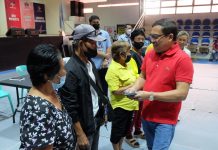In the recent past (2007) and before that, most pupils studying at the Juan Cruz Sr. Elementary School (JCSES) in Panacan, some 16 kilometers north of downtown Davao City, were sickly, undernourished, slow learners and under achievers.
Today, pupils of the school (population 1,074) are top class performers, quite hale and healthy, and confident champions in district and division-wide school competitions.
What contributed to the seemingly miraculous transformation in the span of only three years? Most of the children live in a depressed urban community called the Panacan Resettlement Area whose residents were former informal settlers whose shanties once occupied a road but were removed to give way either to a highway expansion project or for the construction of commercial buildings on titled properties.
The answer lies in the principle of “Service Above Self” — a Rotary International program governing its World Community Service (WCS) to uplift the lives of poor but deserving people in places where there are existing Rotary clubs.
In Davao City, the Rotary Club of East Davao (RCED) has a sisterhood pack with the Rotary Club of Ishinomaki South, Japan to undertake common projects under a “matching grant” arrangement of Rotary International. What one party offers in assistance is matched by the other in terms of financial, technical or material package.
This week, RC Ishinomaki South past presidents (PP) Kohachi Oikawa, Hedeyuki Hasebe, and Kazuo Sezaki (?), are warmly welcomed to the City of Davao by RCED president Antonio M. Ajero and the RCED leadership as they tour the various project areas that have benefited from the sisterhood partnership, one of them the JCSES.
The Japanese visitors will be able to see for themselves how much the lives of the school children have been transformed for the better since the introduction of assorted visual aids, computer equipment, books, school supplies, video documentary materials, including toilet and sanitation facilities.
Former JCSES principal Mariclu “Pinky” Alpas recalls that when she joined the school, there was a school library without books, and teachers were limited to the use of blackboards and chalk when teaching lessons in the absence of visual aids. Absenteeism among pupils was quite high due to hunger and poor health. The average achievement rate was below 60%.
The miraculous transformation began after the supplemental feeding program started. The pupils numbering about 50, are served hot snacks consisting of champorado (chocolate-enhanced rice porridge along with boiled eggs, or at other times with arroz caldo (another rice-based snack containing chicken meat) enriched with malunggay (moringa) which is calcium-rich, or mixed with mungo beans, a source of high protein. The snacks are served daily from 9:00 to 9:30 a.m. A former “home economics” teacher had volunteered to cook for the children, making do with a meager budget of only P3,000 (?) a month for six months. The money comes from RC Ishinomaki South.
The once severely malnourished children gained weight, there was a sharp reduction in absenteesm among them, and they seemed to be more eager to attend classes from their homes now located in a relocation site nearby. Most of the parents earn meager incomes doing odd jobs and the thought that their kids are served snacks in school is certainly a welcome development for them.
No doubt, the additional free school supplies consisting of notebooks, ruled pads, pencils, ballpens, etc. courtesy of Ishinomaki South for the children beneficiaries have given them the incentive to learn their lessons. “Where before the teacher would say: bring out your papers, there were no papers to bring out due to poverty. Absence of writing implements became an impediment to learning. Today, there’s no reason for children to be inattentive”, Ms Alpas proudly reports.
With a toilet and sanitation facility introduced in the campus, children need not go home anymore to relieve themselves. The facility is designed as a community rest room: one wing for boys and the other wing for girls. Each wing has four cubicles with tiled flooring of 22 square meters and half-tiled walls. The boy’s toilet has a blue door while the girl’s has a pink door, she added.
A $500-donation from PP Asano from the same Rotary club in Japan was used to purchase reading comprehension books. With the review and practice materials available, Grade 3 and 5 pupils from the JCSES have been topping the annual “Read-A-Thon” reading and comprehension competition, getting first place in the Bangoy district and second place in the city-wide finals division level.
There is a new male principal in JCSES, and only last Wednesday, the RCED Spouses Association president Estrellita “Ester” de Jesus, assisted by working secretary Shiela D. Estante turned over a new check (HOW MUCH?) for a continuing supplemental feeding program under a matching grant. Ester will help manage the program owing to her professional background as a registered nurse. With such shower of “Service Above Self” the Rotary program is sure to leave a lasting legacy that will be remembered by grateful community members, especially the school children. (Email me at: rjrjrajimenez@gmail.com)






